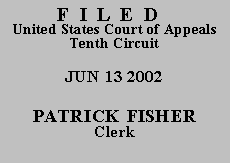

| UNITED STATES OF AMERICA, |
|
| v. | |
| MICHAEL KANE FRIERSON,
|
99-CR-10009-2-JTM) |
Michael Frierson, a federal prisoner proceeding pro se, requests a certificate of appealability ("COA") to appeal the denial of his 28 U.S.C. § 2255 habeas corpus petition. Following a jury trial, Mr. Frierson was convicted of two counts of violating 18 U.S.C. §§ 2314 and 2 (aiding and abetting the interstate transportation of counterfeit securities) and (1) sentenced to thirty-seven months' imprisonment and three years supervised release and (2) ordered to pay a special assessment of $100 as to each count. On direct appeal, we remanded so that the district court might vacate his conviction, sentence, and special assessment "on the second count of interstate transportation of counterfeit securities because both the first and second counts stem[med] from the same 'unit of prosecution.'" United States v. Frierson, No. 99-3378, 2000 WL 1089546, at *6 (10th Cir. Aug. 4, 2000).
Mr. Frierson requests a COA on the same bases he argued in his § 2255 petition to the district courtnamely, ineffective assistance of counsel as to several issues: (1) counsel's failure to request consolidation of the second count; (2) counsel's failure to accurately research Mr. Frierson's criminal history; (3) counsel's failure to object to the admission of certain evidence at trial and failure to effectively cross-examine regarding this evidence; and (4) counsel's introduction of certain allegedly damaging evidence. Pursuant to Haines v. Kerner, 404 U.S. 519, 520-21 (1972) (per curiam), we liberally construe Mr. Frierson's allegations.
To be entitled to a COA, Mr. Frierson must make a "substantial showing of the denial of a constitutional right." 28 U.S.C. § 2253(c)(2). Because the district court addressed his petition on the merits, Mr. Frierson may make this showing by demonstrating that reasonable jurists would find the district court's assessment of the constitutional claims to have been debatable or incorrect. See Slack v. McDaniel, 529 U.S. 473, 483-84 (2000). After a thorough review of the record and the applicable case law, we conclude that Mr. Frierson fails to make such a showing.
In denying Mr. Frierson's § 2255 motion, the district court noted that the first claim was resolved on direct appeal through the vacation of the second count of conviction. As to the remaining three issues, the district court concluded that the actions were either strategic decisions or decisions that did not affect the outcome of the trial, or both.
We agree with the district court's conclusions. Therefore, we affirm for substantially the same reasons as those set forth by the district court in its order filed November 20, 2001. Because Mr. Frierson has failed to make "a substantial showing of the denial of a constitutional right," § 2253(c)(2), we deny his application for a COA and dismiss his appeal.
Entered for the Court,
Robert H. Henry
Circuit Judge
*. This order and judgment is not binding precedent, except under the doctrines of law of the case, res judicata, and collateral estoppel. The court generally disfavors the citation of orders and judgments; nevertheless, an order and judgment may be cited under the terms and conditions of 10th Cir. R. 36.3.